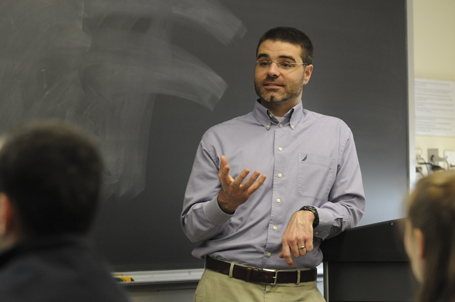Friday, Dec 20, 2013
Certificate will give Rider graduates another vocational option as they enter the workforce
by Adam Grybowski
Five faculty members in Rider University’s School of Education will soon be certified life coaches — the initial step to offering life-coach training to students as part of the University’s Counseling Services Program.
“As far as I know, we'd be the first in the country to integrate life coaching standards into a counseling curriculum,” says Trevor Buser, a School of Education assistant professor who passed the life coach certification exam in December.
Life coaches differ from counselors in that they don’t work with people diagnosed with mental disorders. Rather, they serve to help individuals achieve their goals typically in areas of life transitions, relationships, physical and emotional health, career choices, and spirituality. Some coaches carve out a niche in the field by helping business leaders as executive coaches.
“Life coaches tend to be action-oriented and focused on the present and future rather than on digging up the past,” Buser says. “In my counseling approach, I have often asked clients to examine past issues, but life coaches recommend bypassing that step.
The new certificate will give counseling graduates another vocational option as they enter the workforce. To become licensed counselors, graduates typically work for two to three years under supervision before they can establish their own practice. A life coach certificate arms these graduates with a means to earn money independently as they’re completing their supervised counseling work. “Life coaches can go into private practice during this period,” Buser says.
“Our goal is to embed coaching standards into our programs so that our students meet the educational requirements to be life coaches upon graduation,” says Sharon Sherman, dean of the School of Education.
The field of life coaching began to emerge in the 1970s and solidified as a distinct profession two decades later, in the 1990s, Buser says. “Just recently, the counseling profession has embraced it by offering certification through affiliated bodies,” he adds.
Buser points to a couple of reasons for the growth of life coaching. The stigma some associate with seeking help for mental health issues diminishes greatly when engaging a life coach. “Mental health professionals have traditionally looked at a deficit or impairment, as reflected in the diagnosis of a mental disorder,” he says. “The coaching profession is on the side of optimizing strengths. I think our culture is moving toward a more strengths-based perspective in healthcare.”
Life coaches often approach the patient/counselor relationship on more equal footing than traditional counselors. “He or she is likely to be more transparent by disclosing more about themselves,” Buser says. “A good life coach has the strong interpersonal skills needed to build a partnership of trust and authenticity with the client.”
The dynamic differs from many counseling approaches because life coaches stress accountability as they challenge people to accomplish their goals. “Coaches need to strike that balance of being highly supportive while challenging clients to enact goals,” Buser says. A certified school counselor and licensed professional counselor, he has also worked as a college counselor. “I found learning new coaching strategies enriching,” he says. “Increasing my focus on goal-setting with clients and holding them accountable has enhanced my own skill set.”

